Iranian Blogger Accused of Spying for Israel
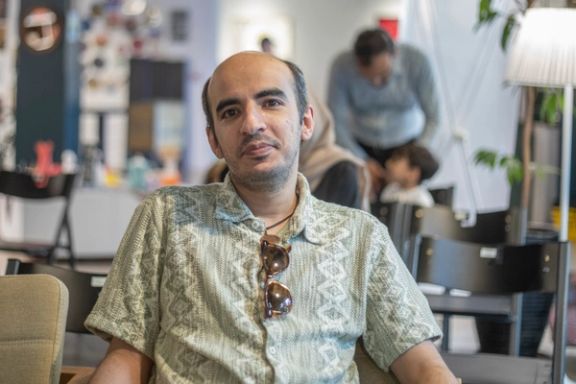
IRGC-linked media in Iran said on Wednesday that arrested blogger Hossein Shanbehzadeh is a "fugitive Mossad agent" with a history of insulting religious figures and connections to Israeli intelligence.

IRGC-linked media in Iran said on Wednesday that arrested blogger Hossein Shanbehzadeh is a "fugitive Mossad agent" with a history of insulting religious figures and connections to Israeli intelligence.
Iran's Judiciary reported the arrest of a "fugitive Mossad agent" in the city of Ardabil, northwestern Iran. The IRGC-affiliated Tasnim News says the detained individual is Shanbehzadeh, the popular social media activist and proofreader arrested on Tuesday.
Shanbehzadeh was arrested in Ardabil on Tuesday. The Ardabil prosecutor's office claimed the individual "had a history of insulting Shia imams and was in contact with high-ranking Mossad officers."
Refuting the accusations as "unjustifiable," his family stated that he has always used his real identity on social media, and that the charges have been levelled against him 24 hours after his arrest, without him having access to a lawyer.
Shanbehzadeh, who posted a dot in response to Supreme Leader Ali Khamenei's tweet last month, employing a sarcastic editorial tone, saw his comment receive considerably more likes than Khamenei's original tweet.
In response to his arrest, numerous users voiced their outrage, linking it to a comment he made under an official post by Ali Khamenei last month, which gained significant traction.
Chess grandmaster and Putin critic Garry Kasparov responded to news of Hossein Shanbehzadeh's arrest with a single dot on his X account.
A hashtag with his name in Persian has been tweeted over 57,000 times on X in the past few days.
One user wrote, "What information did Hossein have access to that he could spy on? Did he have missile or nuclear information? Why are you weaving nonsense..."
Human rights activist and former political prisoner Arash Sadeghi defined the crime of "espionage" under Islamic Republic law on X, writing: "The definition of the crime of espionage is that if a person provides classified information to people who are not authorized to access it, the act is espionage." He continued, "How can you accuse an editor, writer, and satirist whose only platform was his Twitter page of espionage?"
Conversely, some cited Shanbehzadeh's criticisms, including an exposé on Evin Prison's harsh practices, suggesting his arrest stems from governmental ire towards his outspokenness.
Shanbehzadeh was previously imprisoned in connection with the 2019 protests, facing charges of "insulting the sanctities and the leader of the Islamic Republic."
His arrest raises concerns about Iran's history of using espionage charges against critics, including the case of Maziar Ebrahimi, a businessman falsely accused of spying for Israel who was later exonerated.
Ebrahimi was tortured to 'confess' that he had been spying for Israel and was involved in the assassination of Iranian nuclear scientists in 2012. After releasing and allowing him to leave the country, Iran's government said that he was innocent.

The Iranian government has announced a new directive mandating Islamic dress codes for hospital patients and medical workers.
Majid Mohammadian, the head of the Hijab and Chastity Secretariat at the Ministry of Health, unveiled the directive on Thursday, requiring it be implemented in both public and private health institutions nationwide.
According to Mohammadian, "several new standard models of clothing have been designed, produced, including surgical gowns, underwear, trousers for colonoscopy, transvaginal ultrasound, breast ultrasound, mammography, special breastfeeding dresses, veils, and other garments."
He said that the new rules are intended to ensure patients' attire is in compliance with Islamic principles during medical procedures and diagnostic examinations.
The announcement comes amid escalating enforcement of hijab regulations under Project Nour, the clerical ruler's campaign to ensure adherence to hijab laws, which has led to increased physical confrontations and crackdowns on Iranian women.
The government's persistent push to enforce the mandatory hijab has reignited widespread condemnation both within Iran and internationally. Human rights organizations, student groups, and activists have vehemently opposed the measures, arguing that they represent infringements on basic freedoms and human rights.
As Iran waits for the official approval of the controversial hijab bill, titled "Protection of Family Through Promotion of Hijab and Chastity Culture", the government has already begun to enforce the new regime. The new regulations threaten women with arrest and impose harsh punishments such as travel bans for non-compliance with hijab mandates.
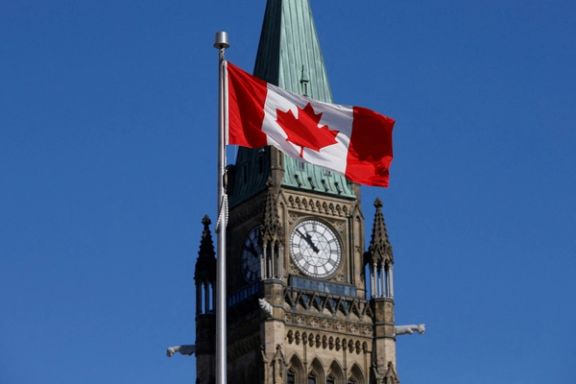
Canada has named Iran as one of the top four countries which gathers information to "harm and threaten Canadian citizens" and to "interfere with political systems and critical infrastructure."
As per the official statement released on Monday, three Canadian ministers identified Iran as one of four countries - China, Russia, Iran, and North Korea - engaged in extensive campaigns to compromise government and private sector computer systems.
"Foreign interference, enabled by sophisticated cyber tools, poses one of the most serious threats to Canada’s national security, economic prosperity and sovereignty, as well as our way of life," the statement read.
In its annual report released in May, the Canadian Security Intelligence Service (CSIS) highlighted the cyber attacks by the Islamic Republic that target Canada.
“Iran combines offensive cyber operations with cyber-enabled influence operations to assist in the pursuit of its geopolitical goals,” stated the CSIS report. “Canada remains a target for opportunistic credential harvesting, phishing attacks, and exploitation of digital infrastructure to facilitate future targeting opportunities against individuals of interest.”
Microsoft's Threat Analysis Center (MTAC) noted that Iran, Russia, and China will likely attempt to influence elections in the US and other countries in 2024.
In February, Iranian-Canadian MP Ali Ehsassi called for an investigation into Tehran's possible interference in the election.
“Given the catalog of malign and illegal activities committed by the Islamic Republic of Iran on Canadian soil, it would be naïve to believe that the Iranian regime has any compunction to shape public opinion in Canada,” he wrote to the Foreign Interference Commission, requesting testimony and relevant documents from Iranian-Canadians and others with substantial interests in the case.
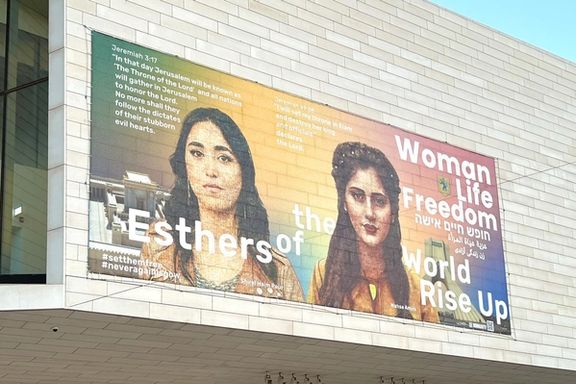
Israel's latest strategy to take on its regional rival Iran is not with a weapon, but a new tool in its soft power arsenal which aims to bridge relations between the two nations locked in escalating tensions.
It may be surprising, but the Israeli Defense Forces (IDF) has rolled out a Persian-language channel on various social media apps, highlighting the significance it sees on the relationship between social media and diplomacy.
Using the channel, the IDF speaks directly to the people of Iran and circumvents the censorship of the Iranian regime, gaining access to millions of Iranians through their social media page ‘IDF Farsi,’ which appears on Twitter, Instagram and Telegram.
“We wanted to build a bridge to the Iranian people,” said Beni Sabti, the mastermind behind IDF Farsi.
Sabti, an Israeli of Iranian origin, used to serve as a Persian spokesperson for the Israeli government on Iranian issues. He is also with the Iran program at the Tel Aviv-based Institute for National Security Studies (INSS) think-tank.
He said it may seem strange to think the Israeli army is providing the outreach, but it’s a system he believes will lead to greater understanding, more dialogue and less wars.
“We only wanted to talk to them [Iranians], and they only wanted to talk to us [Israelis]. Because we knew that these small steps will bring the big step to prevent war….it’s with a lot of emotion and from the heart,” said Sabti.
The social media account also communicates in Persian proverbs and poetic terms by making reference to great Persian poets like Hafez and Saadi.
The messaging is one of unity and kinship between Israelis and Iranians, recognizing a distinction between the people and Iran’s authoritarian government, which has repeatedly called for the destruction of Israel since the 1979 Islamic Revolution overthrew the monarchy and ushered in a clerical regime. Iran is the only country in the world where its government officially denies the Holocaust.
On the platform X, IDF Farsi recently shared a video clip with Iranian-American artist Hooman Khalili who came to Israel to paint a series of murals, celebrating the historic ties between Iran and the Jewish peoples, and raise awareness on the oppression of women and men inside the Islamic Republic.
Khalili, along with an Israeli-Iranian solider from IDF Farsi, unveiled in a video posted to social media, a mural in Israel dedicated to Iranian dissident rapper Toomaj, who has been sentenced to death for his lyrics critical of the regime. IDF Farsi soldiers are often seen in video clips with Iranian dissidents from around the world on their page.
In September 2023, IDF Farsi posted a powerful video honoring Mahsa Jina Amini - marking the one year anniversary of her death. Amini died while under the custody of the so-called morality police for allegedly wearing the hijab improperly, showing too much hair. Her death sparked massive demonstrations in Iran and around the world and was the catalyst for the Women, Life, Freedom movement.
The video uses a montage of anti-government protest videos and photos, asking “what is the price of freedom?"
Communicating information about the Iranian regime’s financing of its proxy terror groups is another message IDF Farsi conveys.
“We show them how, for example, how the regime wastes their money for Hezbollah, or for budgeting Hamas,” said Sabti.
Sabti was born in Tehran seven years before the Islamic Revolution of 1979. He was 15 years old when he and his family escaped persecution in Iran, fleeing on foot and eventually seeking refuge in Israel in 1987.
He served in the IDF’s Intelligence Corps, and as a researcher, mostly in projects related to Iranian culture, influence and media. Sabti is also with the Iran program at the Institute for National Security Studies (INSS) think-tank.
"We talk to them [Iranians] directly, above the head of the regime,” said Sabti.
Sabti told Iran International in an interview in Tel Aviv that the message is also clear to the authoritarian powers in Iran.
"We see you. We know a lot about you. We know how you act, your methods,” said Sabti.
“From time to time, Israel reveals some information that no one knows about. Suddenly we discover that there are some regime terrorists here and there, and they want to harm the Jews,” said Sabti
Iranian public opinion matters to Israel
With tens of thousands of followers, and engagement on both sides, it appears IDF Farsi has had impact and influence.
Israel, "cares about Iranian public opinion,” said Iran analyst, journalist and author Arash Azizi.
"Israel has tried to, probably with some degree of success. Actually, it has tried to influence public opinion in Iran,” said Azizi.
“Iran and Israel are in an indirect war. And the reason that a lot of countries do focus on Iran is that…the average Iranian, does not like the government and does not think like their government. So that's why they try to sort of, target them,” added Azizi.
The Netherlands-based Gamaan institute conducted an opinion survey in 2023 finding that more than 80 percent of 158,000 respondents in Iran reject the Islamic Republic and prefer a democratic government.
Azizi said the Persian language page of the US State department, for example, is failing at outreach.
“The State Department of the United States is not doing so well. You know, if I'll start with something just very basic, the very [Persian] script that they use, it's so outdated,” he said.
The European Union has an Arabic spokesperson but nothing in Persian.
“It’s a lot of resource…it's like a few hundred thousand dollars a year. So not every country will want to spend…But I think countries increasingly realize that they need to do it,” said Azizi.
While he applauds IDF Farsi’s creativity and outreach, he said how much weight the Israeli’s government's message carries to the Iranian public, is a separate issue.
“I think just purely looking at it from as an analyst. Basically they've [Israel] been able to, reach an audience in Iran. They seem to be pretty creative. They try to celebrate Iranians, you know, for example, they do videos for Nowruz and Yalda” said Azizi.
The question is, according to Azizi, is how effective would IDF Farsi’s messaging be if a full out war did take place between the two nations?
“The messaging would be much more important, but also more limited. I mean, if you ran missiles in another country, you know, what kind of messages you put on them would perhaps be of less importance in some ways. Right? So I think it's a tricky, it's a tricky situation,” said Azizi.
Social media to foster conversation despite state control
Social media expert and founder of mediatedreality.com Jesse Miller said the idea of message sharing between so-called adversarial states is not new, it’s just taken on a new form with the online world.
“If we go back in time and we think about the segregation of Germany with the Berlin Wall in Eastern versus West Germany. What we did see was messaging and news of the day being shared across the wall. So we would hear these stories of individuals on the West side, you know, taking a newspaper and cutting it so the article could be then affixed to a brick or a rock and thrown over, the wall in the middle of the night,” said Miller.
Miller pointed to a more recent example in North Korea where he said the WeChat app is increasingly being used to contact China and South Korea, to avoid surveillance from North Korean authorities.
The intent of the platform is what counts, said Miller.
“Sometimes the intent is very benign. It's just information that exists on the internet. Other times it's targeted for the purpose of making people more aware,” said Miller.
Miller said IDF Farsi “is just very targeted with specific language and from a state where potentially, you know, the sworn enemy piece turns into maybe we can just learn more about each other by using a platform where you're not necessarily having to navigate whether state can control or not.”
When it comes to opening up conversations to directly communicate to Iranians in their own language, IDF Farsi is using a platform like Twitter in a healthy way, according to Miller.
“To see Israel use a platform like Twitter to not only directly communicate to individuals who are speaking Farsi, but also communicate in a very healthy way. Some of the content that kind of bridges the gap there is positive when it comes to what we want to see for addressing issues when it comes to conflict,” said Miller.
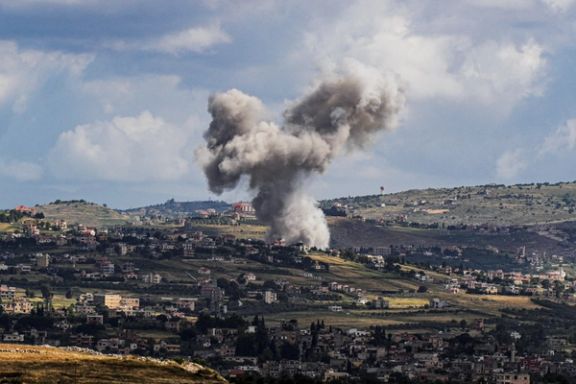
The Lebanese group Hezbollah escalated its ongoing conflict with Israel into a potential full-scale war on Monday by launching drones and missiles into Israeli territory, causing massive fires in the north.
Israeli Prime Minister Benjamin Netanyahu announced on Wednesday morning that the Jewish state is "prepared for an extremely powerful action in the north" in response to Hezbollah's attacks.
Estimates by Israel suggest that Hezbollah has amassed an estimated 150,000 rockets and missiles that are aimed at Israel from southern Lebanon.
At an address at the northern Israeli military base Kiryat Shmona on Wednesday, Prime Minister Netanyahu reiterated his pledge made at the beginning of the war with Hamas to restore security in both the southern and northern regions of Israel.
"Yesterday the ground burned here and I am pleased that you have extinguished it, but the ground also burned in Lebanon,” the Prime Minister said.
Netanyahu further underlined Israel's readiness to respond forcefully to any threats and its commitment to ensuring security in the north, saying: “Whoever thinks he can hurt us and we will respond by sitting on our hands is making a big mistake. We are prepared for very intense action in the north. One way or another, we will restore security to the north.”
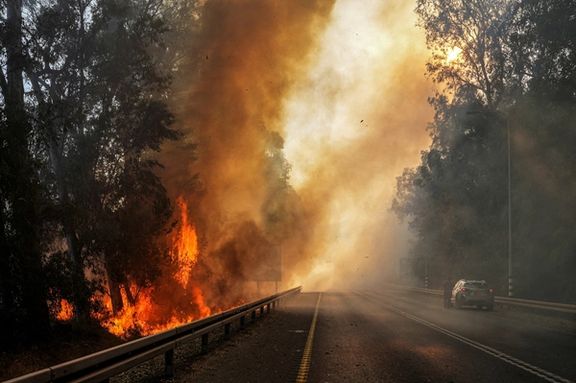
Israel last engaged in a bloody, high-intensity war with Hezbollah in 2006 following the kidnapping of Israeli soldiers by Hezbollah. To end the conflict, the UN Security Council imposed Resolution 1701 on Lebanon, mandating the disarmament of Hezbollah. Neither the UNSC nor Lebanon enforced this resolution.
During a visit on Tuesday to Kiryat Shmona, a northern Israeli city affected by the fires, Israel’s far-right national security minister, Itamar Ben-Gvir, declared, “They are burning here, we need to burn all of Hezbollah’s strongholds and destroy them. War!”
Since Hezbollah allied with Hamas in the ongoing conflict against Israel, which began with Hamas's October 7 invasion, approximately 80,000 Israelis have been displaced from the northern regions. During the invasion, Hamas killed nearly 1,200 people and kidnapped over 250 in a coordinated terrorist attack.
Expert Urges New Strategy Against Hezbollah
A prominent Middle East expert suggests that the Western public, particularly in the US, lacks a clear understanding of the situation on Israel's northern front, including the key players involved, the reasons for the conflict, and the potential outcomes.
Walid Phares, an American academic expert who has advised US presidential candidates, maintains that Hezbollah operates as part of the Iranian state’s military strategy.
He says both Hezbollah and the regime in Tehran are working together closely to plan and execute attacks on Israel.
Noting that the "government in Lebanon is controlled by Hezbollah," Phares added that this latest escalation is the Islamic Republic waging war against Israel through its proxy, Hezbollah.
Phares identified three possible approaches to dealing with the situation in Lebanon. He noted that the two traditional strategies typically considered by policymakers and military planners involve military action.
The first option entails Israel taking against Hezbollah in Lebanon in a “comprehensive way.”
“They will go in and hit Hezbollah’s headquarters, capabilities, resources, and rockets. That is the traditional Israel strategy against Hezbollah: Threaten them with heavy losses and also threaten the government sitting in Beirut that there will be retaliation against their own interests,” Phares said.
Phares explained that, as part of this strategy by Israel, there is a specific threat to destroy Lebanon's infrastructure.
The Lebanon expert argues the issue with the first option is that Israel's threats are only aimed at Hezbollah and, by extension, the Iranian regime.
Furthermore, the first option, Phares says, will not bring tangible change because Israel is unlikely to launch a ground operation against Hezbollah due to opposition from the Israeli public.
The second option would be to continue the status quo war.
“Hezbollah attacks and Israel counter-attacks. This will lead to a long war which will be costly to both sides because Hezbollah’s decision is controlled by Tehran and Tehran does not care about the destruction in Lebanon,” Phares said.
According to Phares, the third option, which has not been seriously examined or embraced by the US or Israel, is to support the Lebanese in revolting against Hezbollah within Lebanon.
”That is the third option that we have been talking about for the last 20 years,” he said.
The preconditions for the third option involve both Israel and the US shifting their strategies to collaborate with the anti-Hezbollah Lebanese population in dislodging Hezbollah, which is backed by the Iranian regime.
Phares emphasized that this option requires full support from the American administration to aid anti-Hezbollah forces within Lebanon.
He also noted that the US has previously supported various opposition movements in the region, such as those against the Islamic State.

Khodadad Afsharian, the former head of the football federation referees' committee, has been apprehended on allegations of corruption, accused of accepting bribes to manipulate match outcomes.
Reports from Tasnim, a news agency associated with the Revolutionary Guards, claim several others have been arrested in the scandal entangling three additional clubs and figures like Soheil Mahdi and Fariborz Mahmoudzadeh, former officials of the Iran Football League organization.
The investigation began with the National Iranian Copper Industries’ complaint against the Mes Rafsanjan club, which catalyzed the initial probe during the 2019 and 2020 seasons.
Last month, the Asr-e-Iran website reported significant corruption within Iranian football, highlighting the inadequate oversight of supervisors and decision-makers, with allegations that agents and managers manipulate transactions to prioritize their financial gain over the sport's integrity.
Corruption is widespread in Iran, especially in sectors dominated by the government and semi-official companies, and it significantly impacts sports, including football. The Iranian economy, heavily controlled by governmental entities disguised as private firms, extends its influence on sports, promoting systemic corruption. This often results in the manipulation of markets, team ownership, sponsorship deals, and player selection.
In Iranian football, although direct corruption within the sport isn't publicly detailed, the overarching governmental control suggests an influence on all major sports. The political and economic dominance by powerful institutions like the IRGC and influential families suggests that this corruption extends into sports, heavily influencing outcomes.